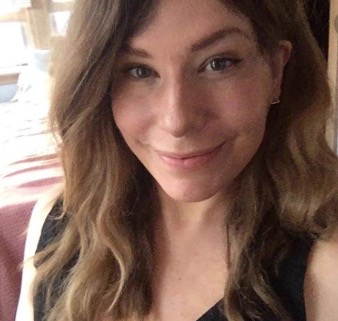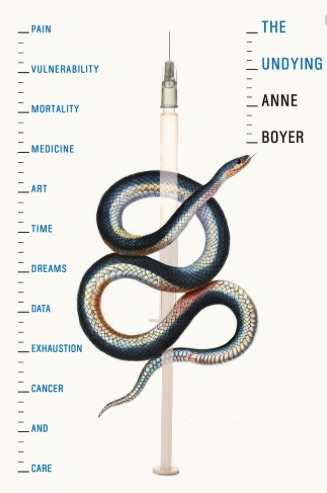By Katherine Verhagen Rodis (December 13, 2019)
The Undying: Pain, vulnerability, mortality, medicine, art, time, dreams, data, exhaustion, cancer, and care, Anne Boyer, Farrar, Straus and Giroux, September 17, 2019, 320 pp, $34.99
“I do not want to tell the story of cancer in the way that I have been taught to tell it.” (Anne Boyer)
Boyer takes you on an intimate journey through her cancer diagnosis, treatment, and recovery. Diagnosed with triple-negative breast cancer, Boyer faced a grim prognosis with few treatment options.
Boyer writes of “sororal death,” what she imagines as “women dying of being women,” in “alienated parallel” times and places. In her experience, breast cancer becomes a vehicle for society to alienate and subjugate women. As cancer eats away at her physical body, the medical establishment eats away at her personal identity, patronizing her resistance to harmful and ineffective procedures. There is no space for agency, she argues, in the cancer pavilion.
In part, her memoir is a political treatise. It is a sharp critique against several societal institutions that profit from cancer patients, including medical and pharmaceutical industries.
Boyer contests chemotherapy and all of its associated drugs, listing off the many adverse physical and psychological effects it can produce, such as brain damage and/or vision loss, leukemia, heart failure, organ failure, and so forth. Some drugs are fashioned from neurotoxins or even mustard gas, she reveals.
Though she does not explicitly critique the non-profit industry, she calls out corporations that run “pinkwashing” cause-marketing campaigns for breast cancer awareness. Boyer admonishes companies that help patients “‘look good feel better’ for your free high-quality makeup kit.’”
Coined by San Francisco-based Breast Cancer Action (BCAction), pinkwashing is the promotion of a pink ribbon product by a company or organization that claims to support breast cancer charities but doesn’t provide transparency about their involvement or produces products that are linked to the disease.
Such cause-marketing campaigns create awareness about breast cancer but risk subjugating the women whom they are trying to “save.”
Too many women are told how to be “good survivors” of breast cancer, Boyer argues, that every patient declared cancer-free should learn how to be “a celebrity survivor, smiling before the surgery and smiling after too.” Laughing. Triumphing. By ardently challenging problematic representation, Boyer is resisting epistemic violence, that what damages a group’s ability to speak and be heard.
She views these kinds of messages as doing more harm than good. She looks to other people online, primarily women, who suffer from terminal cancers. One post that penetrates her to her core is from one woman who tags her posthumous YouTube video with the warning “please do not let them say I lost my battle.” She takes great exception to the idea that women who die from breast cancer are somehow to blame for their fate. That if only they pursued the right treatment, followed the advice of the right physician, took enough cannabis, followed a paleo diet, and so on, they would still be alive:
Dying of breast cancer is not evidence of the weakness or moral failure of the dead. The moral failure of breast cancer [. . .] is in the world that makes them sick, bankrupts them for a cure that also makes them sick, then blames them for their own deaths.”
Satirizing the belief that breast cancer patients can be cured primarily by adopting positive attitudes, she shares with wry humour that one day: “I [came] across a headline: ‘Attitude is Everything for Breast Cancer Survivor.’ I look for the headline ‘Attitude is Everything for Ebola Patient’ [. . .] or ‘Attitude is Everything for Those with Congenital Syphilis.’”
There are several moments in the The Undying that are “feisty,” filled with irreverent, morbid humour. But it is a harrowing tale, told in a heartbreakingly lyrical tone, as Boyer is an accomplished poet and essayist. Her recent prizes including the 2018 Cy Twombly Award for Poetry from the Foundation for Contemporary Arts and winner of the 2018 Whiting Award in nonfiction and poetry.

As Virginia Woolf wrote in On Being Ill (1926), there is a “poverty of language” around pain, words often falling short of capturing its acuteness and merciless endurance. Though Boyer calls pain “an ugly gathering of adjectives,” she meditates upon its “naked grammar.” Thus, The Undying is a modern-day, self-reflective Odyssey that navigates the idea of pain through allusions to Classical and Western literature. Boyer gravitates towards women’s voices in particular, from the likes of Emily Dickinson and Audre Lorde to fellow patients in cancer pavilions and online vlogs.
There is no transcendence paradigm in The Undying, nor should there be. She rejects a “Dolorist” view that intense physical suffering can lead to beauty and a higher state of mental awareness. Boyer does not want to participate in “body-tourism,” leading the reader through a journey of physical adversity and despair to spiritual triumph and joy.
I am thankful to Boyer for her insight and compassion for those who inspired her, who shared their journeys with her. I am thankful for The Undying, a work that champions the beautiful and terrible contradictions of Boyer’s life as a cancer survivor.
Katherine Verhagen Rodis is the Senior Coordinator, Philanthropy and Prospect Research at the Holland Bloorview Kids Rehabilitation Hospital Foundation. She monitors leadership giving prospects as well as charity and business sector news. (she/her). @kverhagenrodis
